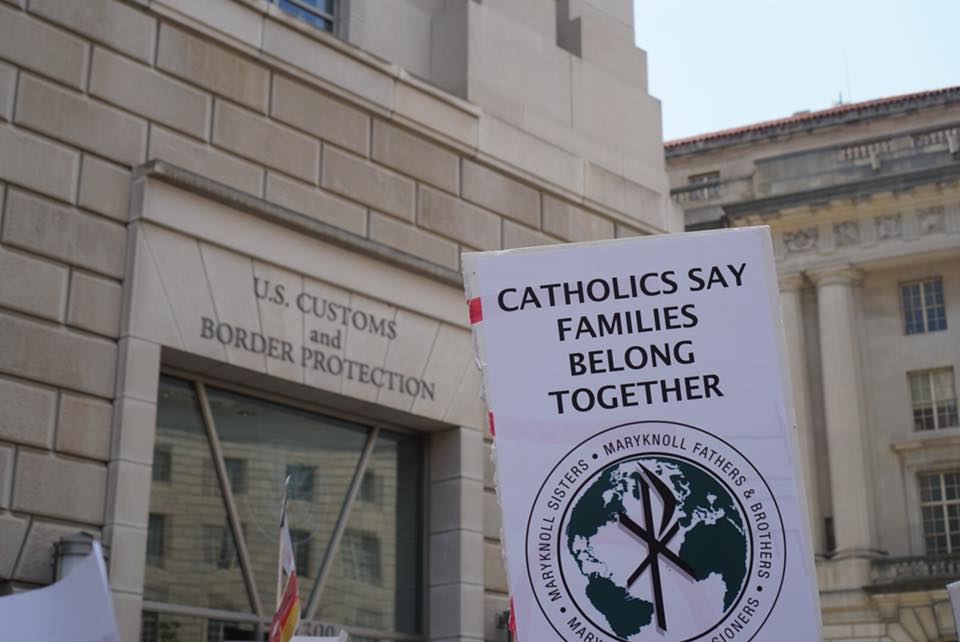Justice for Immigrants and Refugees Policy Brief
This is an excerpt from our two-page policy brief on U.S. immigration and refugee policy.
Inspired by the Gospel and Maryknoll missioners’ commitment to stand with vulnerable communities around the world, we offer these two-page briefs as resources on the intersection of global policy and Catholic social thought. Here is an excerpt. Find the complete brief at https://bit.ly/MOGCPolicyBriefs This article was published in the November-December 2021 issue of NewsNotes.
People trying to immigrate to the United States suffer from the failures of an outdated immigration system and ongoing political gridlock preventing reform. The patterns and landscape of immigration to the United States have greatly changed since the framework for our system was created in 1965, but it has been more than 30 years since the last significant reform. Experts across the board continue to call for comprehensive immigration reform, while some elected officials pursue attempts to block avenues to immigration, including through broad immigration bans, restriction of access to asylum, and other means many consider inhumane and illegal.
The U.S. Immigration System
The highly complex U.S. immigration system is founded on principles of family unification, economic need, and humanitarian protection. The number of visas available under each of those categories per year is limited, and the demand far outpaces the supply, leading to huge backlogs in the system. Legal U.S. residents must often wait decades for visas for their family members to be approved. Similarly, competition for work visas is fierce in industries such as agriculture, construction, and hospitality. Many employers in these industries claim they have no choice but to hire undocumented workers.
Despite heightened border enforcement, the undocumented population has grown to about 11 million, largely due to the absence of legal pathways to immigration and ongoing “push” factors prompting people to leave Central America and Mexico, including gang and state-sponsored violence, poverty, and climate change. Data suggest that militarization of the U.S.-Mexico border and efforts to deter undocumented immigrants from the U.S. have not reduced their number. Instead they contributed to several humanitarian crises, most egregiously the family separation crisis of 2018, in which at least 2,648 children were separated from their parents upon arrival, some of whom remain separated today.
Asylum and Refugees
The United States has historically granted visas for humanitarian reasons, such as for asylum seekers, but policy changes under the previous Administration made it effectively impossible to gain such protection. By law, asylum seekers are offered the same protection as refugees – permanent protection from persecution to due race, religion, nationality, or membership in a social or political group – but they must apply for asylum at a U.S. border or within one year of their arrival.
The United States has long been the world leader in offering resettlement to refugees. Under the Trump administration, the U.S. refugee program was greatly diminished, resulting in refugees remaining stranded in temporary shelters abroad. The number of refugees allowed to enter the United States annually shrank from an average of 95,000 to less than 18,000.
Under the Biden administration, the number of refugees resettled in the U.S. is projected to rise and the funding for U.S. resettlement agencies, of which the U.S. Conference of Catholic Bishops is the largest, is expected to increase dramatically in 2022.
The need for Christians to care for migrants and refugees and address the root causes of forced migration is greater than ever. The world is facing a staggering number of people who have been forcibly displaced and the worst refugee crisis since World War II.
Maryknoll Experience
“Parents with children, and young adults, were waiting for days, even weeks, on the bridges [between the U.S. and Mexico], sleeping on their belongings or cardboard boxes spread out on the sidewalks… during their unusually long waits to be processed…
“[M]any of those seeking asylum are fleeing violence in the northern triangle of Central America due to gangs that threaten their lives and livelihoods, and due to domestic abuse. The often-corrupt governments of Guatemala, El Salvador and Honduras, long supported by the United States, ignore the alarming growth of violence against poor families, and especially women, in their countries.” — Sr. Ann Hayden, MM, Peñitas, TX
Prayer
“Merciful God… Inspire us, as nations, communities and individuals, to see that those who come to our shores are our brothers and sisters. May we share with them the blessings we have received from your hand.
“May we recognize that together, as one human family, we are all migrants, journeying in hope to you, our true home, where every tear will be wiped away, where we will be at peace and safe in your embrace.” – Pope Francis
Take Action: Ask Congress to support comprehensive immigration reform https://bit.ly/ImmReformMOGC

